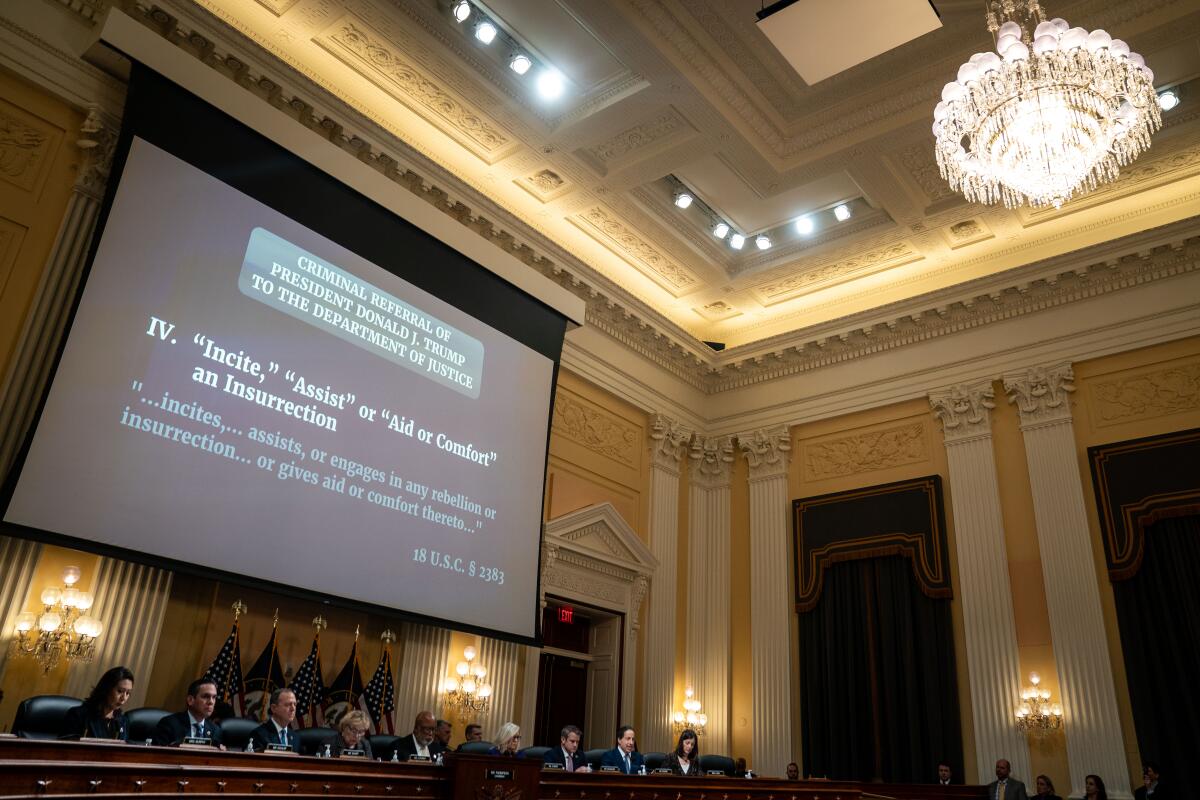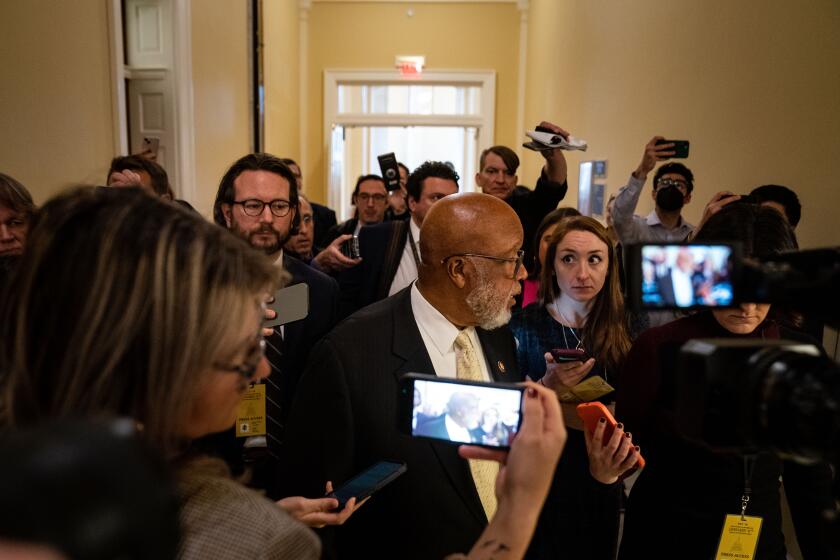House Jan. 6 committee releases 34 transcripts from investigation

- Share via
WASHINGTON — The House committee investigating the Jan. 6, 2021, insurrection delayed publishing its final report Wednesday, but provided new details with the release of 34 transcripts of depositions taken during its investigation.
Many of the released transcripts are from lesser-known figures who played behind-the-scenes roles in the attempt by former President Trump and his allies to overturn the 2020 presidential election, though the list includes some of the biggest names involved, such as California attorney John Eastman, the architect of the legal theory embraced by Trump that posited the vice president could reject certain states’ electors.
Nearly all of the witnesses in the released depositions pleaded the 5th Amendment at some point in their testimony in response to questions from committee members and staff that showed what the panel hoped to learn and what dots they were trying to connect. For example, the committee asked Trump confidant Roger Stone whether he had discussed Jan. 6 and strategies for the day during a Dec. 27, 2020, meeting with Trump at the then-president’s Florida home.
Committee Vice Chair Liz Cheney (R-Wyo.) asked Stone whether he ever called Trump on the former president’s personal cellphone. Stone invoked the 5th Amendment. She asked whether he thought violence “was justified” on Jan 6. He invoked the 5th Amendment again.
Stone even invoked his 5th Amendment rights when asked his age and address.
The committee wanted to know from Eastman what emails and phone numbers he used to discuss the 2020 election, where he had stored any documents related to the election and whether he would provide specific documents, such as a seven-page paper he had written that Rudolph W. Giuliani shared with Georgia legislators during a Dec. 3, 2020, state Senate judiciary hearing. The House Jan. 6 committee also asked whether Eastman had reached out to state lawmakers after the election.
Investigators also asked detailed questions about a memo Eastman had written about the vice president’s role in certifying election results. They noted that he had discussed his memo in media interviews with the permission of the president, though he was invoking the 5th Amendment in speaking with investigators.
Eastman was the only person besides Trump whom the committee referred to the Justice Department by name for potential criminal charges stemming from the panel’s investigation.
Trump’s former national security advisor Michael Flynn invoked the 5th Amendment for nearly every question, including what his role was in planning and strategizing to find evidence of fraud after the 2020 election.
Flynn did, however, answer when asked whether he knew why Trump had pardoned him after he’d confessed to lying to the FBI about having communicated with Russia.
“Because I think he saw my whole case as a travesty of justice,” Flynn said.
Evidence the Jan. 6 committee doesn’t release by the end of the year could be boxed away for decades or lost forever.
Former Trump lawyer Jenna Ellis pleaded the 5th when asked about a number of people mentioned on her log of privileged materials she was withholding from the committee, including documents related to Trump’s former Chief of Staff Mark Meadows and advisor Stephen K. Bannon.
Ellis did answer questions about her efforts to obtain materials to fulfill the committee’s subpoena, but declined to answer more detailed follow-ups questions. For example, she invoked her 5th Amendment right when asked why, of the 350 text messages she had exchanged with Meadows between Nov. 3, 2020, and Jan. 13, 2021, only 35 were listed on her privilege log.
Ellis gave the committee a number of affidavits and declarations related to election fraud allegations, but invoked the 5th when asked whether she or anyone else affiliated with Trump had attempted to investigate the allegations in those documents. She also declined to answer committee questions about whether there was a plan before the election, as early as September 2020, to create a fake slate of electors.
Among the lesser-known people whose transcripts were released were former White House employee Garrett Ziegler, who had acted as a conduit after the election for those scrambling to prove fraud had occurred; and his boss, former White House trade advisor Peter Navarro.
Ziegler invoked the 5th Amendment in response to nearly every question posed by the committee, including those about the so-called Green Bay Sweep, a procedural strategy crafted by Navarro and Bannon to enlist Republican members of Congress to force lengthy debates over the validity of certain state election results in an effort to pressure state lawmakers into reexamining their results and possibly handing Trump the election.
Wednesday’s release included just a portion of the over 1,000 depositions taken during the committee’s 18-month investigation, which concludes with the release of the final report. Republicans are not expected to reconstitute the committee after they take control of the House on Jan. 3.
The final report, which the committee planned to make public Thursday, is expected to include evidence that was not presented during the committee‘s nine public hearings this year, along with detailed descriptions of the scheme pushed by Trump and his allies in an effort to overturn the 2020 presidential election results.
Times staff writer Freddy Brewster contributed to this report.
More to Read
Get the L.A. Times Politics newsletter
Deeply reported insights into legislation, politics and policy from Sacramento, Washington and beyond. In your inbox twice per week.
You may occasionally receive promotional content from the Los Angeles Times.










